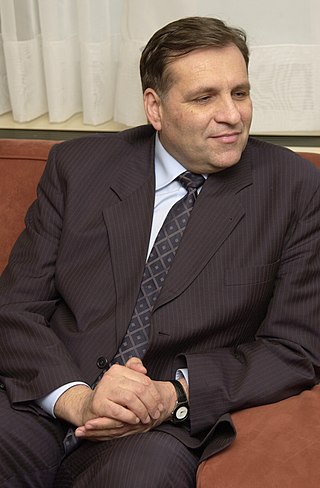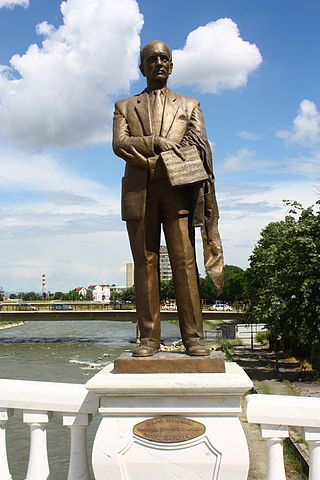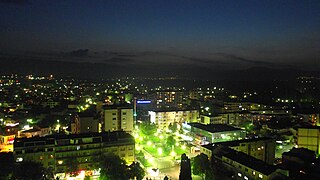Related Research Articles

Boris Trajkovski (GCMG) was a Macedonian politician who served as the second President of Macedonia from 1999 until his death in 2004 in a plane crash.

The Ministry of Internal Affairs (МВР) or MOI is a government ministry of the Republic of North Macedonia. The current minister is Panche Toshkovski. Assigned to the ministry are a Public Security Bureau and a Security and Counterintelligence Administration. The ministry has existed since 1944.

Law enforcement in North Macedonia is the responsibility of the Police of the Republic of North Macedonia.

Israel–North Macedonia relations refer to the bilateral political relations between Israel and North Macedonia. North Macedonia has an embassy in Tel Aviv. Israel does not have a resident ambassador.

The University of Information Science and Technology "St. Paul The Apostle" is a public university in North Macedonia. As of 2018–19 school year, a total of 375 students are enrolled at the university.

Skopje 2014 was a project financed by the Macedonian government of the then-ruling nationalist party VMRO-DPMNE, with the official purpose of giving the capital Skopje a more classical appeal but designed more earthquake-proof. The project, officially announced in 2010, consisted mainly of the construction of colleges, museums and government buildings, as well as the erection of monuments depicting historical figures from the region of Macedonia. Around 20 buildings and over 40 monuments were to be constructed as part of the project.

Holy See–North Macedonia relations refer to the bilateral political relations between the Holy See and the Republic of North Macedonia.
Fadil Nimani was a Kosovar Albanian insurgent commander of the Kosovo Liberation Army (KLA) during the Kosovo War and the National Liberation Army (NLA) during the 2001 insurgency in Macedonia, in which the Albanian population sought independence of Albanian-inhabited areas in FR Yugoslavia and Macedonia, respectively.
The Military Service for Security and Intelligence of North Macedonia is an intelligence office within the Ministry of Defence of North Macedonia.
Sašo Mijalkov was the ninth director of the Administration for Security and Counterintelligence (UBK) of the Republic of Macedonia.

National Institution Cultural Center Trajko Prokopiev - Kumanovo abbreviated NICC Trajko Prokopiev is a cultural center in Kumanovo, North Macedonia. It holds the name of the local composer Trajko Prokopiev (1909-1979). Former name was Cultural Home "Josip Broz Tito" (Дом на култура ,,Јосип Броз Тито.

Nova Jugoslavija Square is a municipal square in Kumanovo, North Macedonia.
Adzi Tepe Airport is an airport in Kumanovo, North Macedonia.
On 21 April 2015, 40 armed men with UÇK patches attacked a border police station located at Gošince, near the Kosovo border. The group tied and beat the policemen manning the outpost and stole weapons and radios. They stayed for a couple of hours, filming the event, and issued a message through an interpreter before leaving.
Zoran Verushevski was the third director of the Administration for Security and Counterintelligence (UBK), the domestic counter-intelligence and security agency of the Republic of Macedonia.
Boris Protić was a Mayor of Kumanovo Municipality in Macedonia.

In April 2016, protests began in the Republic of Macedonia against the incumbent President Gjorge Ivanov and the government led by the interim Prime Minister Emil Dimitriev from the ruling VMRO-DPMNE party. Referred to by some as the Colorful Revolution, the protests started after the controversial decision by President Gjorge Ivanov to stop the investigation of former Prime Minister Nikola Gruevski and dozens of politicians who were allegedly involved in a wiretapping scandal. The demonstrations were organized by "Protestiram" and supported by a coalition led by the Social Democratic Union of Macedonia and other opposition parties, in addition to the newly formed Levica demanding that the government resign and be replaced by a transitional government and that the parliamentary elections planned for 5 June 2016 be cancelled, on the grounds that the conditions for free and transparent elections were not in place. The government and its supporters, who had organized pro-government rallies, maintained that the elections on June 5 were the only solution to the political crisis, with some observers blaming the opposition for creating a "Ukraine scenario" in Macedonia.

The battle of Raduša was part of the wider inter-ethnic conflict known as the Insurgency in the Republic of Macedonia between the Albanian NLA and Macedonian security forces concentrated near the border with Kosovo. The brunt of the fighting happened near the village of Raduša and Bojane villages that guard the roads to the Rašče water supply which supplies water to the capital city of Skopje.
References
- ↑ "Управување со безбедносно-разузнавачките служби во" (PDF) (in Macedonian). Macedonia: Analytica. Archived from the original (PDF) on 4 March 2016.
- ↑ "Administration for Security and Counterintelligence (UBK)". Administration for Security of Classified Information of the Republic of Macedonia. 2009. Retrieved 5 November 2013.
- ↑ "Profile on the Director of the Administration for Security and Counterintelligence". Ministry of Internal Affairs of the Republic of Macedonia. 2011. Archived from the original on 28 December 2013. Retrieved 5 November 2013.
- 1 2 "Profile on the Administration for Security and Counterintelligence of the Republic of Macedonia". Ministry of Internal Affairs of the Republic of Macedonia. 2011. Archived from the original on 5 November 2013. Retrieved 5 November 2013.
- ↑ Макфакс (1 September 2019). "Димовски: УБК заминува во историјата, денеска е првиот работен ден на Агенцијата за национална безбедност". МАКФАКС (in Macedonian). Retrieved 1 September 2019.
- ↑ faktor.mk Retrieved 18.05.2015 (Macedonian)
- 1 2 3 4 5 6 7 8 novamakedonija.com.mk 11.6.2009 Archived 2015-05-20 at the Wayback Machine Retrieved 18.05.2015 (Macedonian)
- ↑ vest.com.mk 4/15/2002 Archived 2015-05-19 at the Wayback Machine Retrieved 18.05.2015 (Macedonian)
- ↑ utrinski.com.mk 16 октомври 2006 Retrieved 18.05.2015 (Macedonian)
- ↑ vest.com.mk 5/17/2001 Archived 2015-04-02 at the Wayback Machine Retrieved 16.05.2015 (Macedonian)
- ↑ vest.com.mk 11/11/2002 Archived 2015-05-19 at the Wayback Machine Retrieved 16.05.2015 (Macedonian)
- ↑ vest.com.mk 2/3/2001 Archived 2016-03-09 at the Wayback Machine Retrieved 18.05.2015 (Macedonian)
- ↑ makedonskosonce.com Archived 18 May 2015 at the Wayback Machine Retrieved 16.05.2015 (Macedonian)
- ↑ dnevnik.com.mk 18 март 2006 Archived 2015-05-18 at the Wayback Machine Retrieved 16.05.2015 (Macedonian)
- ↑ utrinski.com.mk Retrieved 16.05.2015 (Macedonian)
- ↑ Горан Николовски и Лазо Велковскисе новите директори на УБК и БЈБ 16.06.2017 Archived 2018-02-05 at the Wayback Machine Macedonian, Retrieved 17.06.2017
